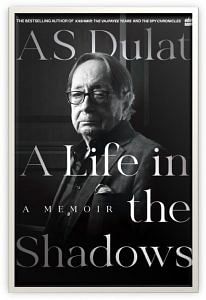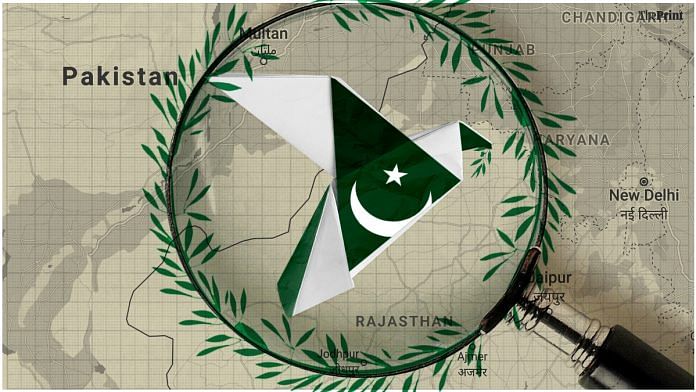One of the first and most brutal lessons—which became a guiding principle in my own methodology as a spook—that Kashmir taught me was that the gun is the most counterproductive means to an end. In January 1990 alone, the Intelligence Bureau lost four officers to the bullet within the space of three weeks. That helped crystallize my line of thought. We will all die by the gun, so why not talk? That was the most obvious question in my mind, as I watched the violence of the winter of 1989–90 come to a head. The idea is to get to the persons you’re aiming to get—and engage with them. I have always felt that engagement is crucial, even if it must be kept secret. We spooks are sinners, after all—more than we are saints. We talk to our enemies more than we talk to our friends.
I look at it like this. Whether it is a politician or a prime minister, or even members of our bureaucracy, they are entitled to look at life differently. Spooks do provide politicians not only with crucial information but also a cover for accountability. A spook’s way of looking at the same thing should be different, but yet we have had chiefs who have been too straitlaced. As a result, Delhi has seen things only in black and white. That doesn’t work in difficult areas, like the Northeast, in Punjab or in Kashmir. Kashmir, in particular, is mostly grey and constantly in need of empathy, compassion and compromise. It took Delhi a very long time to understand Sheikh Abdullah, and even today we do not understand why Kashmiri leaders talk a different language in Kashmir and a different language in Delhi. None of this means that you need to stop engaging. To be a spook is to understand humanity in all its shades and nuances. For us, it has ever been the nature of the beast.
In the course of my career I have been relieved to discover that I am not the only one who has pushed for a greater emphasis on engagement and dialogue. My contemporary, Efraim Halevy, then director of Israel’s intelligence agency, Mossad, told me at a meeting in Tel Aviv in 1999 that he believed firmly in the importance of dialogue. In his context, he understood, for instance, that Hamas, the Palestinian militant faction, could neither be got rid of nor subdued. Talking was the only way out. The reputed former director of Britain’s MI5, Elizabeth Manningham-Buller, believed in much the same principle, advocating for a stronger engagement with al Qaeda, during her time in the service. And yet, this line of thinking has been considered soft by most of my colleagues in Indian intelligence. I have never quite understood it—because it is so contrary to my own line of thinking—but over time, I have come to discover the reasons behind why the other end of the spectrum exists.
In a word: Pakistan.
Pakistan lies at the heart of the paranoia, the mistrust, the lack of imagination and the absolute convention that governs much of the espionage game in Kashmir. Now, as far as convention goes, we’re bound by the rules of the book, so it is obviously difficult to bypass it altogether. But the lack of imagination, I think, is what stands out ultimately, much like a sore thumb. In hard places like Kashmir, you need to be able to think outside the box (a phrase that I learned from Dr Manmohan Singh, who often used the same words). But the question here then becomes—does one need to be cautious beyond everything else, or does one take a risk or two? This is a debate that will never end, but my firm belief is that unless you try something, you won’t get results. Certainly, you might—and you probably will—fail, but unlike in life, you don’t get too many second chances in intelligence. The tricky part lies in your ability to walk that thin line between imagination and trust.
When it comes to intelligence officers, we all find it exceptionally hard to trust. We are terribly possessive about our sources, our information, our operations. But let’s say that I am running an operation in Kashmir, and I want to get to someone. Now I don’t have to be in love with him exactly, but trust does build over time.
Also read: How Ladakh and Doklam played into US’ great tech game
There is no such thing as instant chemistry in spookdom, and more particularly in a state as troubled as Kashmir. It took me years to get to know Farooq Abdullah, and even today I wouldn’t dream of taking that relationship for granted. Even the best of our operators will be—and are—careful in hard zones. Yet when it comes to Pakistan, the hang-ups are immense, and the major stumbling block is always trust.
Running agents and double agents is par for the course in spy craft, so it is disappointing to acknowledge that when it comes to cooperating with American agents, for example, we have no such mistrust. Pakistan, in our minds, is our only adversary. That’s not the correct approach. Every intelligence agency that operates on our soil is an adversary. Yet when it comes to Pakistan, we think twice—sometimes more—Yeh Pakistan ke liye kaam karta hai. (He is working for Pakistan.) My point is—yeh Pakistan ke liye kaam karta hai might be true, but doesn’t that make him all the more important for us? Think of it this way. Let’s go with the assumption that we remain hung up on Pakistan. Even with this hang-up in play, what would be the biggest feather in your cap, as an Indian intelligence agency? I would imagine it would be if you could get the Inter-Services Intelligence (ISI) station chief to work for you, or the defence attaché, or, indeed, any Pakistani here. Isn’t that common sense? But somehow, we have an apprehension that a Pakistani is untrustworthy, that he will create trouble, that he is, simply speaking, a rascal.
Rascals, according to me, are the best agents. To believe otherwise shows a lack of confidence, a lack of imagination and a pervading sense of suspicion and mistrust. Counter-intelligence and its various facets—agents, double agents, moles—is a prime example of where you can use rascals best. When we talk of rascals and moles, though, I must make it clear that each of these guys can be and often are different, and not all of them have just one endgame. Moles, for example, have many uses. They are not meant to simply glean information and report back to their handlers. Their uses can be extensive if you apply a little imagination. There are moles within governments, and moles within intelligence agencies. As far as the latter is concerned, that gets a little tricky, because moles can work cleverly across each of the service cadres that these agencies might have. It was a mole, a plant, or a walk-in, who led to the assassination of Osama bin Laden at the hands of the CIA.
 This excerpt from A.S. Dulat’s A Life in the Shadows has been published with permission from HarperCollins.
This excerpt from A.S. Dulat’s A Life in the Shadows has been published with permission from HarperCollins.



